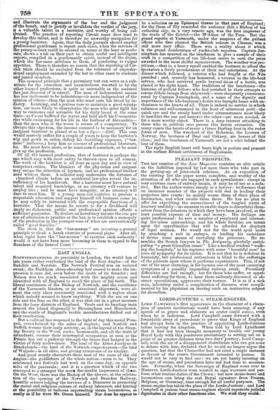EAST ANGLIA.
NOTWITHSTANDING its proximity to London, the world has of late years rather overlooked the land of the East Angles--of the Sud-folc and Nor-fob. The Norwich Festival was an isolated event ; the Holkham sheep-shearing had ceased to make the im- pression it once did, even before the death of its founder ; and Nelson was too much associated with the mighty ocean and identified with all England to recall the place of his birth. The liberal sentiments of the Bishop of Norwich, and the excellence of the Yarmouth bloaters, or an occasional shipwreck, were al- most the only ideas necessarily associated with a region about which nobody seemed to know anything. With the sea on one side and the fens on the other, it was shut out in a great measure from the busy districts of England. Trade and its bustling train crossed the island diagonally to Birmingham and Manchester, and the cradle of England's textile manufactures drifted out of their recollection.
' But a railroad has reopened to the light of day this moral Porn- ten, overwhelmed by the ashes of neglect; and Norfolk and S.uffolk resume their early activity, as, in the legend of the Sleep- lug Beauty in the Wood, cooks, housemaids, and all the train of attendants, resume their interrupted occupations as soon as the Prince has cut a pathway through the briars that hedged in the tdetixn of fairy malevolence. The land of the Abbot Jocelyne de Brackelonde—the land of the Norwich crape-weavers—the land of Walpole—is all alive, and giving symptoms of its vitality. • And good sturdy characters these men of the seats of the old Angles—the godfathers of the whole nation—seem to be. They celebrated two festivals last week on the same day, on opposite Bides of the peninsula; and it is a question which of the two conveyed to a stranger the more favourable impression of them. On the West, there was the Bishop of the diocese, at the celebra- tion of the opening of the Norwich and Brandon Railway, heartily acknowledging the services of a Dissenter in promoting the moral and religious culture of railway labourers, and hinting at the possibility of balloons superseding steam locomotives, as loony as if ho were hIrk, Green himself. Nor does he appear to be a solecism on au Episeapal throne in that part of England; for the Dean of Ely reminded the audience that a Bishop of his cathedral city, in a vary remote age, was the first improver of the roads of the district—the M'Adam of the Fens. But the grandat Yarmouth, under the auspices of the gallant officer raattaofirst planted the British colours in Chemin, was a still more racy affair. There was a reality about it which is the grand desideratum of yacht-club regattas. Captain jer- ningham has spurred on the beachmen to give a sample of their craft in a competition of ten life-boat crews to earn the prize. awarded to the most skilful manoouverers. The weather was pro- pitions,—that is, a heavy squall enabled the boatmen to afford the spectators a lively presentment of their real enterprises. At the dinner which followed, a veteran who had fought at the Nile presided ; and, scarcely less honoured, a veteran in the life-beat service, who had survived perils beyond those of a battle was placed at his right hand. The traditions of the IseachmenLthe histories of gallant fellows who had perished in their attempts to rescue fellow-beings from shipwreck—were eloquently commemo- rated by Captain jerningham, and a sense of the dignity and importance of the life-boatman's duties was brought home with en- thusiasm to the hearts of all. There is indeed no service in which' calmness and self-command in the hour of uttermost peril—the quick eye and the steady hand under circumstances most likely to bewilder the one and unnerve the other—are more needed, or for a more worthy object. There is a deep interest attaching to those who in perilous seas pursue this heroic avocation. On many coasts the hearts of many a Grace Darling. beat in the ruder forms of men. The wreckers of the Bahamas, the Lootsen of Norway, the boatmen of Deal and Orkney, are heroes of this class ; and the beaclunen of Yarmouth are not a whit behind the best of them.
The right English heart still beats high in prelate and peasant in the earliest British settlement of Englishmen.


























 Previous page
Previous page